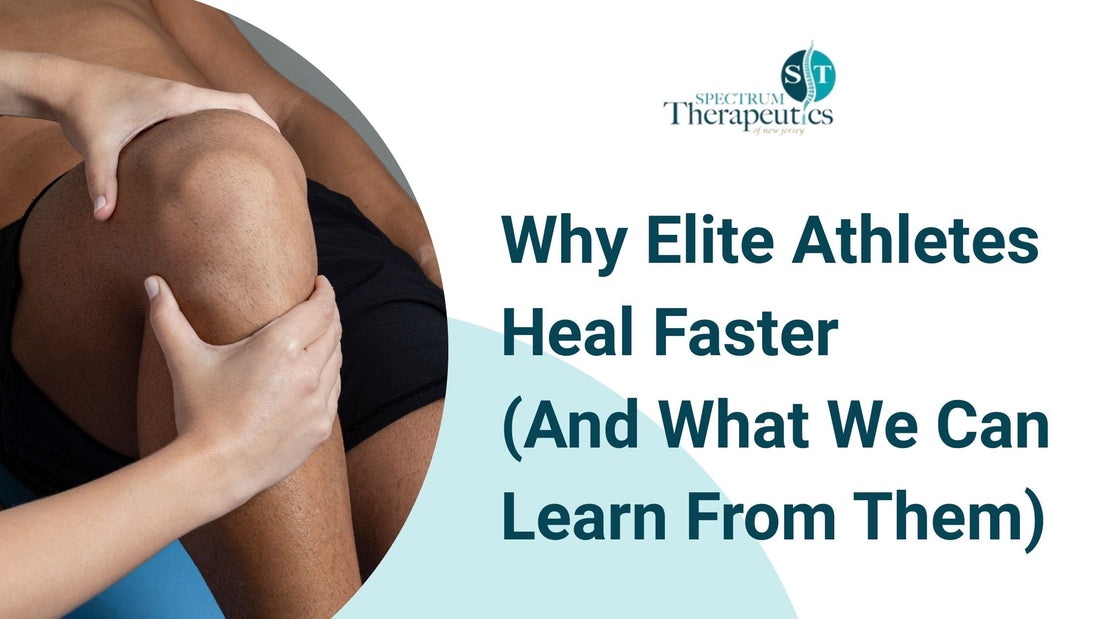
Why Elite Athletes Heal So Much Faster Than the Rest of Us (And What We Can Learn From Them)
Dr. Rob Letizia PT, DPTShare
I've been treating injuries for over a decade, and there's something that never stops fascinating me. You'll see a professional athlete tear their ACL, and they're back on the field in 6 months. Meanwhile, someone sprains their ankle playing weekend basketball and they're still limping around three months later. What gives?
Here's the thing, it's not because athletes have superhuman healing powers. They just know secrets that most of us don't. And honestly? These aren't really secrets at all. They're just strategies that work, but somehow never make it to the average person dealing with a tweaked knee or a sore shoulder.
So let me share what I've learned from working with everyone from high school athletes to folks who just want to get back to chasing their kids around the yard.
Stop Waiting It Out, Get Help Right Away
Look, I get it. Nobody wants to be "that person" who runs to the doctor for every little ache. But here's what I see all the time: someone hurts their wrist, figures they'll give it a few days, and by the time they come see me two weeks later, what could have been a quick fix has turned into a much bigger problem.
The pros don't mess around with this stuff. They get evaluated immediately, and you should too.
Also, forget everything you learned about RICE (rest, ice, compression, elevation). We don't really use that anymore. These days, it's all about something called POLICE:
- Protect the area so you don't make things worse
- Optimal Loading with gentle movement (not complete rest!)
- Ice, Compression, Elevation for swelling
The biggest change? We want you moving safely as soon as possible, not sitting still for weeks.
Sleep Is When the Magic Happens
This one drives me crazy because it's so simple, yet everyone ignores it. Your body literally repairs itself while you sleep. Not during the day when you're up and abou, at night, when everything slows down and your immune system can focus on fixing what's broken.
I know, I know. When you're hurt, sleeping is miserable. Your shoulder throbs every time you roll over, or your ankle keeps you awake. But this is where managing your pain properly becomes crucial. Those first few nights of good sleep can make or break your recovery timeline.
One Size Fits None
Here's something that bugs me about a lot of injury advice online, it's all generic. "Do these five exercises for knee pain!" But your knee pain isn't the same as someone else's knee pain. Maybe yours started from running, theirs from a fall. Maybe you're 25 and they're 55. Maybe you want to get back to tennis and they just want to walk their dog without wincing.
This is why working with someone who actually knows what they're doing matters so much. A good physical therapist will adjust your plan based on how you're responding, what you're feeling, and what your actual goals are. Not just hand you a photocopied exercise sheet and send you on your way.
And please, talk to us! Tell us when something feels weird, when you had a bad day, when you tried something that worked better than expected. We're not mind readers, but we're pretty good at problem-solving when we have all the information.
You Can't Out-Exercise Bad Nutrition
I see this all the time. Someone's doing their rehab exercises religiously but they're living on energy drinks and takeout. Then they wonder why their healing is taking forever.
Your body needs building materials to repair itself. Good protein for rebuilding tissue. Anti-inflammatory foods like berries, leafy greens, and fish to calm things down. And water, lots of water. I can't tell you how many people are walking around chronically dehydrated and don't even realize it.
It's not about being perfect. It's about giving your body what it needs to do its job.
Movement Really Is Medicine (But Timing Matters)
Twenty years ago, if you got hurt, the advice was simple: don't move it until it stops hurting. We've learned that's actually pretty terrible advice for most injuries.
The key is gentle, guided movement. Not "work through the pain" movement, but careful, purposeful movement that helps your body remember how things are supposed to work.
I always tell my patients: respect the pain, but don't be ruled by it. A little discomfort during movement is normal and even helpful. Sharp, shooting pain? That's your body telling you to back off.
Use It or Lose It (Gradually)
Once you're past the initial injury phase, the goal shifts to building back up. And this is where a lot of people either do too much too fast, or stay too cautious for too long.
I love using resistance bands for this phase because they're forgiving but still challenging. Pool exercises are amazing too, the water supports your body weight while letting you move in ways that might still be too much on dry land.
The worst thing you can do is stay on crutches or avoid using an injured body part longer than necessary. I've seen people develop problems in their other leg because they spent months babying an injured ankle that was actually ready to start working again.
Your Brain Is Part of the Equation
This might sound touchy-feely, but your mindset genuinely affects how fast you heal. I've seen it over and over, two people with nearly identical injuries, but one stays positive and focused on getting better while the other spirals into worry and frustration. Guess which one recovers faster?
It's not about toxic positivity or pretending everything's fine when it's not. It's about focusing on what you can control and trusting the process. Some days will be better than others. Some weeks you'll feel like you're moving backward. That's normal.
The Bottom Line
Elite athletes don't have access to some secret healing technology the rest of us don't know about. They just follow a proven approach: get help early, prioritize rest and recovery, stick to a personalized plan, fuel their body properly, move intelligently, progress gradually, and keep their head in the game.
You can do all of this too. It just takes knowing what actually works versus what sounds like it should work.
If you're dealing with an injury right now and feeling frustrated with how slow things are going, you're not alone. Recovery is rarely linear, and it's almost never as fast as we want it to be. But with the right approach, you really can get back to doing the things you love.
At Spectrum Therapeutics in Wayne, we work with people every day who thought their injury would never get better. If you're tired of dealing with pain or limitation that's keeping you from living your life, give us a call at 973-689-7123. We're not interested in cookie-cutter solutions, we want to understand your specific situation and help you get back to being you.



